Daily Cannon
·23 May 2020
Tomas Rosicky: One of Arsenal’s greatest number 7s
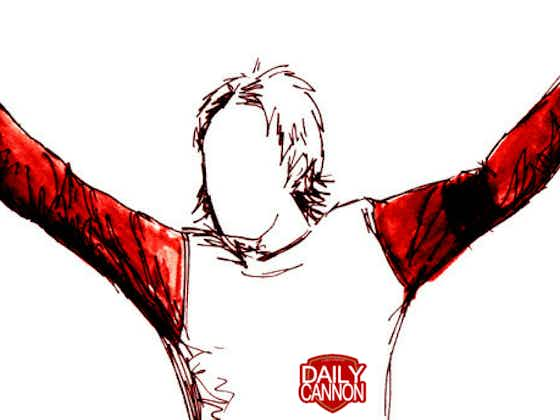
In partnership with
Yahoo sportsDaily Cannon
·23 May 2020

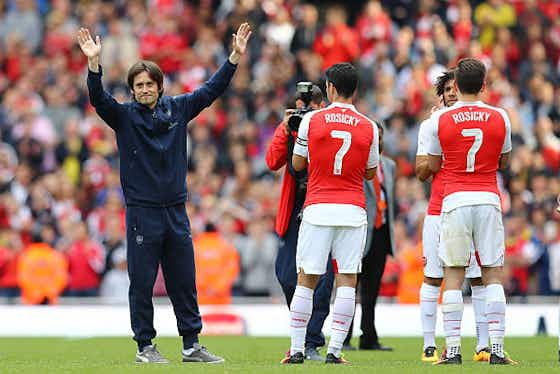
Tomas Rosicky’s Father Jiri spent his whole career in the Czech leagues with Sparta Prague and latterly Bohemians CKD Prague, and elder brother Jiri was also a keen footballer who would go on to play in Spain, Austria and the Czech Republic. Mother Eva also competed at the top level, but in table tennis. All in all, some pretty impressive genes.
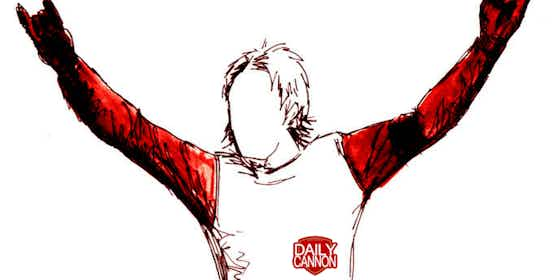
Tomas Rosicky briefly attended the CKD Kompresory football academy in 1986, but left to join the youth ranks at Sparta Prague together with Jiri, aged eight and ten respectively. However, their careers were to diverge dramatically from there. While Jiri left the club for Atlético Madrid’s B team in 1996, Tomas continued to impress locally, eventually making his first team debut in 1998 and collecting his first silverware that same season – a winner’s medal in the Czech First League.
The 1999-2000 season was Rosicky’s real breakthrough year as Sparta Prague again swept to the national title. During the year, he made 36 appearances, scored 7 goals and won “Talent of the Year” at the Czech footballer awards. He also won a first national cap at just 19.
However, it was success on an altogether bigger stage – the UEFA Champions League – the following season which brought Rosicky to prominence. The January transfer window of 2001 brought with it a move to Borussia Dortmund in a record breaking £18m deal that made the Czech the most expensive signing in the Bundesliga.
Success immediately followed, as it had at Sparta, with his first full season returning a Bundesliga winners medal and a place in the UEFA Cup final. However, it was to be the only team trophy of a five-and-a-half year spell in Dortmund, as the German club endured a difficult period which ultimately led to the sale of their Westfalenstadion and a decline in fortunes.
Tomas Rosicky did pick up individual honours in spite of Dortmund’s relative lack of success, collecting the Czech Footballer of the Year awards in 2001, 2002 and 2006, as well as the Czech Golden Ball (roughly equivalent to the Football Writers’ Awards) in 2002. Never a prolific scorer, Tomas’ biggest strength was the way he orchestrated the game and created opportunities for others to apply the finishing touch.
In qualifying for the 2006 World Cup Rosicky had unusually scored a host of goals, netting seven times in 12 games, and again attracting the attention of Europe’s biggest clubs.
Arsène Wenger moved early to secure his signature in the run up to the tournament, and attracted by the type of football Arsenal and Arsène Wenger play, Rosicky signed on the bottom line to play for “the best club in Europe”.
The fee of just £6.8m looked a steal for a player so talented and versatile who was performing consistently at the top level.
The result was that Tomas Rosicky went into the World Cup with a new club side to impress, and impress he did. In the opening game against the United States, he scored two goals in a 3-0 win. The first was a 30 yard screamer crashing into the net past the despairing dive of Kasey Keller, while the second was a delicate chip into the top right corner after racing onto a through ball.
While the Czech Republic failed to secure any further victories and were subsequently eliminated, Rosicky had whetted the appetite of Gunners the world over. He would shortly be appointed captain of the Czech national side in a very successful summer for the midfielder, and the idea of signing a European star playmaker about to enter his peak years was enough to get the juices of even the grumpiest Gooner going.
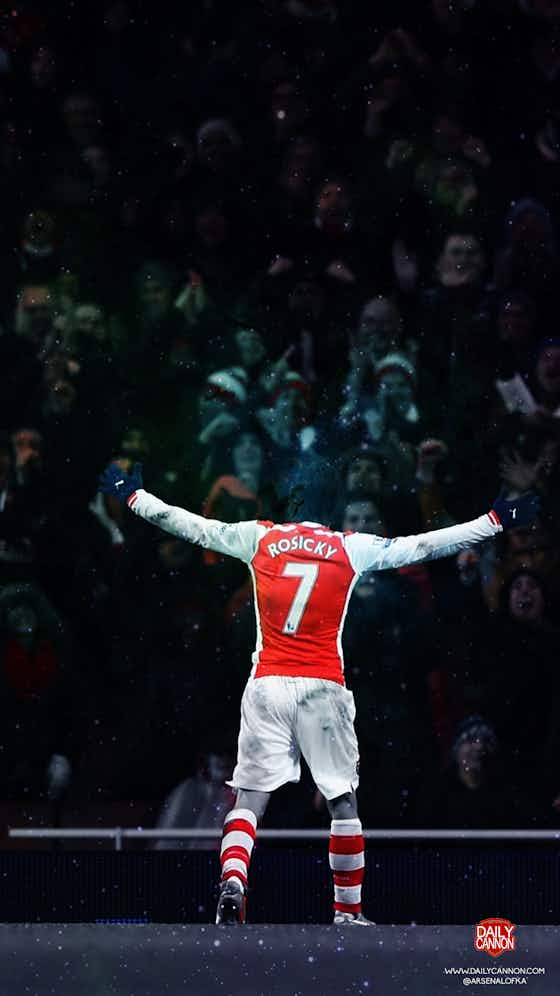
Number seven was an unusual choice – Rosicky has typically worn 10 throughout his career, but that number was already taken – undeservedly so by William Gallas – and so Tomas ended up with the famous number seven on his back instead.
Rosicky’s first season with Arsenal was topsy turvy. As the club ushered in a new era with the move to Ashburton Grove, Tomas was the only major signing of the summer. Expectations were high following the previous year’s heartbreak in Paris, and fans hoped that his magic would be able to lift the club to another level.
And then Arsenal suffered their worst ever start to the Premiership.
“If you love football, you love Tomas Rosicky.”
Rosicky first goal for the club, a rising strike which found the top corner against Hamburg, collected three important points in the Champions League and brought some respite, but questions were starting to be asked – was Little Mozart a luxury that this paper-thin Arsenal squad could ill afford?
Often played wide, it was inevitable that he would be compared with the recently departed and much idolised Robert Pires, and six goals in 37 appearances compared unfavourably with the Frenchman’s record of roughly one in every three games, and 28 goals over the previous two seasons.
However, those quicker to judge missed the trait that would become something of a trademark for the Czech throughout his time in North London – each of his goals came in victories, and in all but one of the games, Arsenal would not have won without those goals. In the other game he scored the crucial opening goal.
Arsenal never quite lived up to their billing in that opening season, and similarly Rosicky struggled to meet the lofty expectations placed on his shoulders upon his arrival in England in a world quick to judge upon statistics alone.
It is much harder to appreciate the qualities of a player all about subtlety and guile when they are surrounded by players who aren’t quite of the same standard. In that first season, Tomas found himself rubbing shoulders with some players who, with the greatest of respect, weren’t going to set the world on fire – perhaps they were limited in ability, perhaps were too used to relying on a certain Thierry Henry, but the result was the same.
In any case, the Premier League is a notoriously tough division, and even the greatest players sometimes struggle to hit the ground running. As with many overseas imports over the years, Rosicky’s second season was to see the Czech acclimatise and flourish.
We were finally seeing the player Rosicky could be, the impact he could have on this team. By January he had already scored double the number of league goals – six in 15 starts – and Arsenal were sitting pretty at the summit of the Premier League after three disappointing seasons.
An FA Cup tie with Newcastle United on 26th January 2008 was negotiated with ease, but of more significance was Rosicky’s withdrawal after just nine minutes with a hamstring niggle.
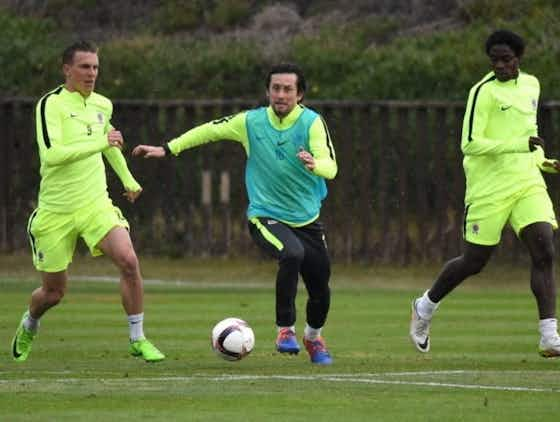
Early reports said that the midfielder would be sidelined for “a question of days, not weeks” yet it was to be Tomas’ last competitive appearance for Arsenal until September 2009. The Czech was forced to watch helpless from the sidelines as a horrific injury to Eduardo derailed the season.
Tottenham and Manchester United started the slump, dumping the team out of the domestic cups and then Liverpool scored two late goals to end hopes of another Champions League final. All the while, the league form continued to slip. Painful to watch as a fan, it must have been heartbreaking to be stuck in the treatment room and unable to influence the results.
The frequency with which Arsène Wenger refers to his players’ “character” has become something of club legend over the years, but if anything defines strength of character, it must surely be the way that Rosicky’ has persevered through some very dark times. As Rocky Balboa famously said, “It’s about how hard you can get hit and keep moving forward.”
Following his initial injury, Super Tom took blow after blow as the prognosis was extended from days to weeks, and then to months. Then, upon finally making his comeback in a friendly he suffered another setback which would keep him out a further six weeks.
Rosicky was able to show immediately upon his return to competitive action against Manchester City on 12th September 2009 just what Arsenal had been missing, assisting one and scoring the other of Arsenal’s two goals although they lost the game 4-2. He was to score just two more goals in the 2009-10 season, but both crucial ones, which would see the club salvage four points and go top of the league.
Time on the sidelines saw the midfielder develop the more tactical side of his game, rather than being just the pure offensive player he had been on his arrival in North London. Increasingly, his assists outweighed his goals but Rosicky’s game has always gone beyond his statistics.
Our midfield maestro was starting to display his ability to conduct the game at the very top level, accelerating the tempo by bursting past a player, creating a chance or turning on a sixpence to spread the play. Whenever the pressure was on, whether to defend or overturn a lead, he was able to step up and guide those around him. Wenger often introduced him in games where Arsenal need a significant boost in dynamism, even when he wasn’t playing him at other times.
Increasingly, Wenger has looked to play the Czech centrally, thus extending his sphere of influence to both wings of the pitch. It was in this role that Rosicky suffered his second cup final defeat at the club, as a last minute mix-up again saw the club miss out on the League Cup by the narrowest of margins against Birmingham in 2011. Yet another low.
But it takes the lows to make the highs all the sweeter, and when I think of Super Tom, three highs stand out for me.
One is a moment on 26th February 2012, when he scored Arsenal’s third goal of the day to put his side ahead for the first time after an awful start, and in doing so set us on course for the (first) 5-2 demolition of Tottenham. Rosicky was awarded the Man of the Match champagne, along with the joy of writing his name into Arsenal folklore.
The second moment was on 16th March 2014, when an unstoppable bullet strike again struck the back of a Tottenham net. This time at White Hart Lane, it settled another North London Derby in Arsenal’s favour. Struck with the trademark outside of the boot, it was a screamer from the very top drawer. It turns out Rosicky has more in common with Pirès than expected – scoring regular goals against our noisy neighbours is the stuff of legend.
The final moment is a goal in the 2013-14 season which, in any other year, would have won the Goal of the Season award. As it was, it was pipped to the post by a similar Jack Wilshere goal, with little to choose between the two. I am of course talking about the fantastic team goal against Sunderland which saw Tom start and finish a move in which he played one-twos with Wilshere and Giroud before cushioning the ball over Mannone.
Beautiful.
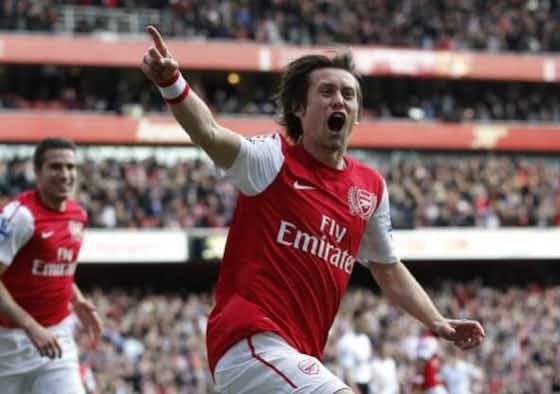
One thing all these moments have in common is Rosicky’s ecstatic celebrations – there is something that warms the soul about a player who celebrates his goals as he scores them – fiercely and joyfully – and as if they were the first and last goal he will ever score.
Tomas’ passion for the club has never been in doubt, and his loyalty unswerving – it is rare indeed for any player to play ten years at the same club in the modern era, particularly one from overseas. It was a delight and a privilege to be at Wembley in May 2014 to see the midfielder lift his first – and long overdue – trophy with the club.
In that game, with Hull flagging as we entered extra time, I remarked to my parents that this game was crying out for Rosicky’s bursts of pace. For once, it took just a short while for Arsene to agree with me, and the Czech entered the fray, immediately galvanising the team. We all know what happened next.
If the first FA Cup Winners medal was overdue for Super Tom, a second was a well deserved reinforcement of the quality player he still is. Although he missed the final itself, Rosicky’ contribution to the earlier games of the campaign was critical in an era where you need a squad rather than a team.
With Brighton invigorated by getting a goal back in the fourth round, Tomas’ goal settled an unfamiliar Arsenal side containing a number of players with little experience or lacking fitness. And what a goal!
A cheeky one-two with Olivier Giroud set up our Czech maestro for a brilliant volley which left Stockdale stranded. It was to be the crowning glory on a fantastic performance which saw him exude quality and determination in equal measures.
For that performance alone, Rosicky deserved his second Winners’ medal in as many years. A true Arsenal great.
In my book any player prepared to tell the media that “Chelsea are boring” is a legend for that comment alone. Funny how that was back in 2007, and Mourinho’s side are still struggling to shake that same label in 2015.
It was an absolute pleasure to watch Tomas pull on the famous red-and-white number seven.
Always one to give 100%, he was like a fine wine that got better with age.
Arsène famously said of our Czech midfielder: “If you love football, you love Tomas Rosicky.”
Well then, guilty as charged.
I love football. I love Tomas Rosicky.






























































